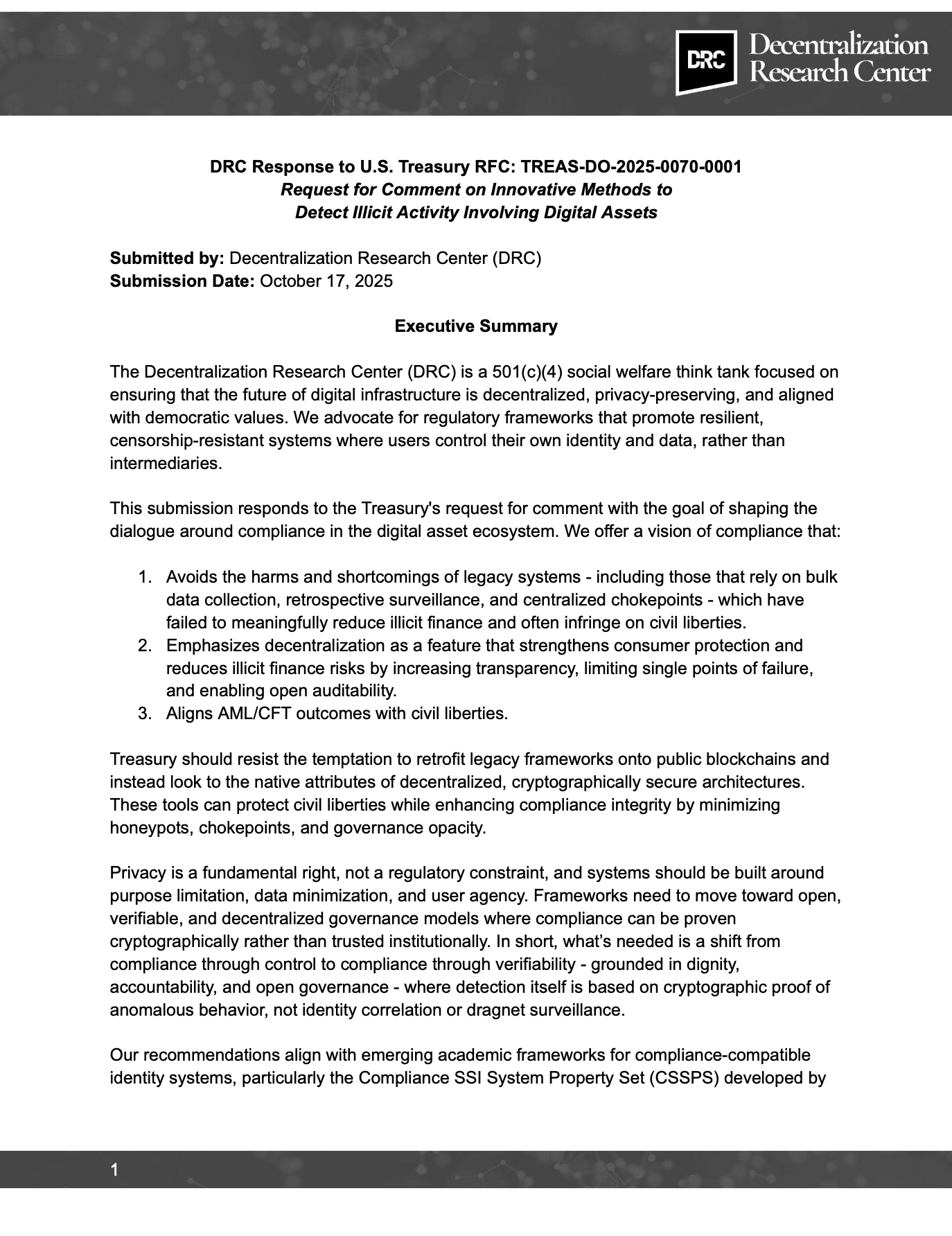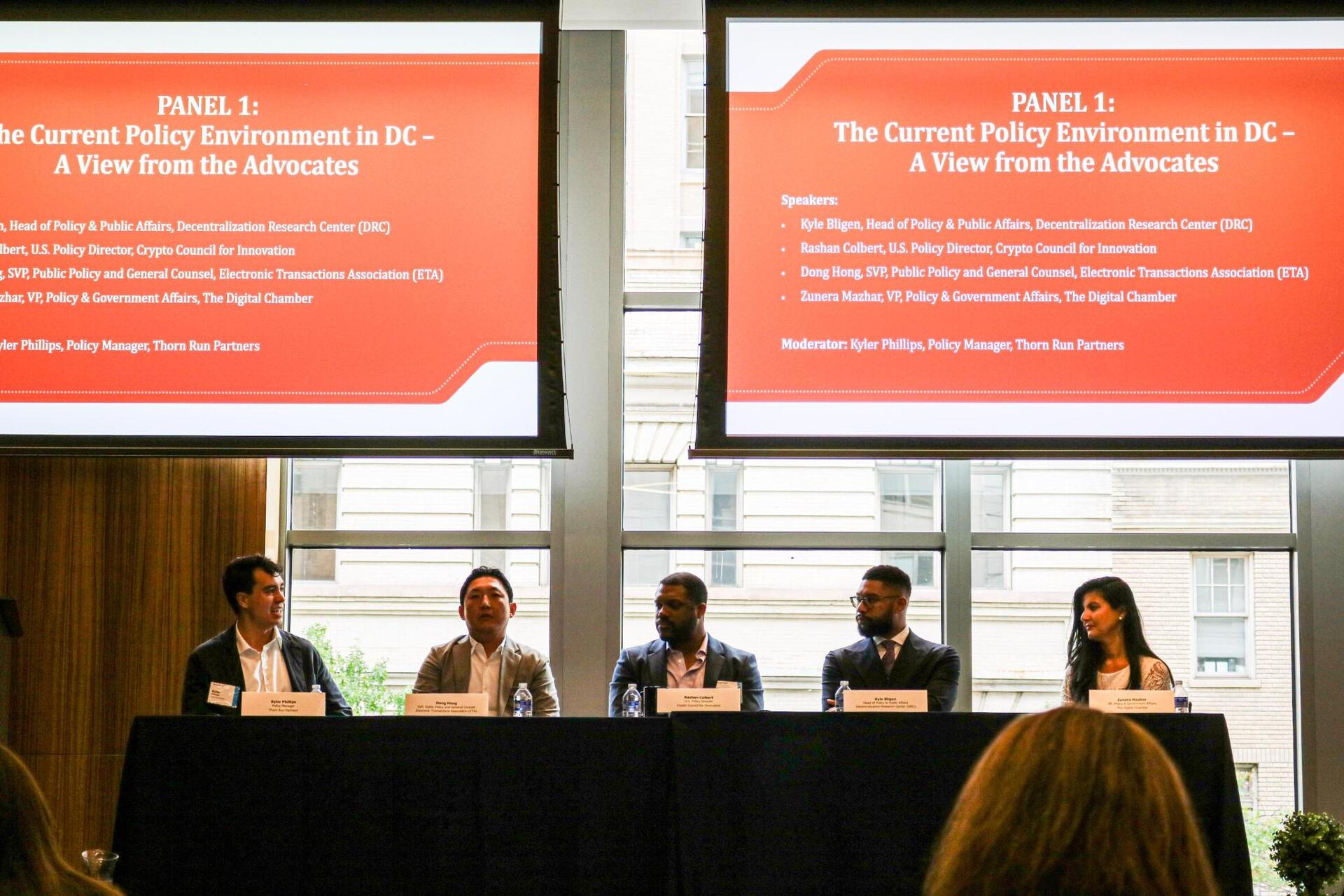- DRC Monthly Update
- Posts
- 🔬 DRC: October Report
🔬 DRC: October Report
Treasury RFC on Digital Assets, Privacy Summit, AI and Memory, Online Governance and Attention Economies, and more.
Welcome to the Decentralization Research Center report, a monthly briefing on events and research relevant to decentralization, DAOs and governance.
This Month’s Updates
Key Notes
This month, we submitted our letter to the U.S. Department of the Treasury in response to its Request for Comment on innovative methods to detect illicit activity involving digital assets.
In it, we introduce six core pillars on which modern identity systems must be built:
🔹 Data Minimization: Only disclose what is strictly necessary
🔹 User Control: Users must hold and manage their own credentials
🔹 Open Standards: Systems should be built using open and widely available standards such as W3C Verifiable Credentials and DIDs
🔹 No Mandatory Intermediaries: Users must be able to prove eligibility without being required to go through centralized brokers. Users should be free to choose intermediaries if they want one, but systems must not hardcode their use. Where access is required, it should be based on auditable proofs of attributes, not full identities.
🔹 Voluntary Adoption: Digital identity systems must remain optional. Users must retain the right to complete compliance through traditional paper-based methods without penalty or discrimination
🔹 Purpose Limitation: Identity data must only be usable for its intended function, with strong technical and legal enforcement
Read the full response here.
We were proud to partner with Project Glitch for the DC Privacy Summit, where Kyle headed to explore the idea that privacy often means security. The summit reflected the recognition that new approaches to managing illicit finance risks in decentralized systems are needed, and how emerging cryptographic privacy tools can help.
The Deep Dive
Shaan Jain’s “When One Company Owns Your Memory” looks at how the major AI players are looking to monopolize your memory … and how decentralized alternatives give memory back to the people who create it. Here is an excerpt from this month’s DRC blog post:
AI assistance is quickly becoming a large part of our daily lives. Apple’s new release of Apple Intelligence brings on-device models to iPhone/Mac/iPad for writing tools, image generation, and a more useful Siri that can act in your apps. Google’s Gemini (on-device) reads what’s on your screen, drafts and summarizes text, and offers many more functionalities across Android. The same goes for every other company, folding assistants into their stacks—Microsoft with Copilot, Anthropic with Claude, startups with task bots, the list goes on.
These summaries, texts, and answers to questions big and small are being stored, and the industry has made it clear that long-term memory will be a defining capability of AI. OpenAI’s ChatGPT now draws on saved notes and past chat history to personalize future replies, and the push is clearly toward assistants that remember you over months and years. Sam Altman highlighted memory as a central direction for GPT-6; "people want memory," he said, signalling a race to win by knowing you best. Anthropic just rolled out automatic memory for enterprise users. “Personalized AI” is the marketing phrase, but “personalization” also means your memory is being stored somewhere and, currently, it’s not with you.
Continue reading here…
The Full Rundown
Other stories and research we’ve been tracking for you:
Kelsie Nabben offers 8 critical insights from her forthcoming book on blockchain security.
Mel Oxenreider explores a central question in Web3: how can DAOs demonstrate compliance through decentralization?
The Decentralized Identity Foundation argues that content needs an ingredient list.
A new paper argues that geographic decentralization is vital to achieve any decentralization. By Sen Yang, Burak Öz, Fei Wu, and Fan Zhang.
Andy Hall asks: Which crypto tokens should include governance rights?
Kevin Frazier and Joshua Joseph discuss how decentralizing "memory" will be vital as AI advances.
Stefaan Verhulst, Roeland Beerten and Johannes Jutting look at what we do when official statistics — the bedrock of evidence-based policy — risk becoming just another casualty of distrust in government.
What does decentralized storage look like? Together with Hypha Coop, Open Archive created the first secure, p2p, decentralized storage backend for their mobile archiving app Save.
In "Statutory Obsolescence in the Age of Innovation," Network Law Review presents the problem of statutory obsolescence in the regulation of rapidly evolving technologies, with a focus on GDPR and generative AI.
Techquitable
Nathan Schneider, professor of media studies at the University of Colorado Boulder and director of the Media Economies Design Lab, joined Samuel Vance-Law on the DRC’s podcast to discuss his co-authored paper, “Online Governance Surfaces and Attention Economies,” how attention functions as labor, and what it means to design governance systems that respect people’s time and focus.
If you’re working on related research or would like to get involved in our work, please reach out to us via [email protected]. We’d love to hear from you!
Connor Spelliscy
Executive Director
Decentralization Research Center



